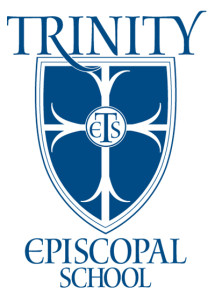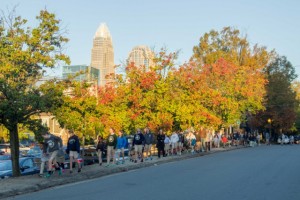
By Smarty Guest Blogger Mary Kate McAlister, 2nd Grade Instructional Assistant, Trinity Episcopal School
I am by no means a seasoned Trinitarian, but I have indeed been seasoned by Trinity. Having graduated from Sewanee: The University of the South in May of 2013, I can’t say I was totally ready for “the real world” come August 2013. And yet, that real world was at Trinity Episcopal School, on the edge of E. 9th Street, and within a community of people that I would soon know as welcoming, foundational, intentional, diverse, spiritual, affirming, nurturing, adaptive, and purposeful.
These sentiments are not unique to me, nor are they unique to the faculty and staff. They are universal within our community — embedded in hearts and guiding our steps.
Transformation
When I was growing up, I thought that the whole point of school was to learn a bunch so that one day…wa-la! You’d be all grown up and have a job. Trinity is developing a different mindset. In every form and fashion, Trinity is transforming individuals, adults and children alike, who walk through its iconic archway and into the doors. This transformation, is happening every day — in Faith Studies, Service Learning partnerships, classrooms, tribes and Koinonias (small, intentional fellowship groups that work together to strengthen community through conversation and shared experiences). In Mentoring Moments (our affinity group for lower school students of color), in challenging faculty meetings, in Book Buddies and Science Buddies. In the heart of Uptown Charlotte, administrators and teachers are facilitating conversation and providing space for students kindergarten through eighth grade to expand their vision and understanding of this great big world, in Charlotte and beyond.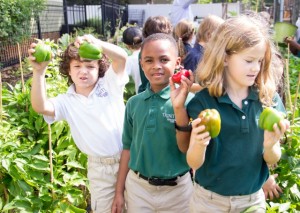
We are deeply rooted in the Charlotte community. It’s nearly impossible not to be. We are within walking distance from Uptown and often utilize all our location offers — ImaginOn, Discovery Place, the spontaneous events taking place in our First Ward neighborhood. Students grow up knowing and understanding that communities do not have walls, and therefore our neighbors don’t all live under a particular zip code. Our neighbors include the friends we meet at Friendship Trays and Loaves and Fishes, after harvesting carrots, sweet potatoes, radishes, and greens from the 8th Street Garden where our students plant and care for seeds until they are grown. Our friends include students at the Metro School, Epiphany, La Escuelita, Shamrock Gardens, Windsor Park, and the Charlotte Bilingual Preschool. Our friends include adults at Urban Ministries, InReach, Refugee Support Services, Hope Haven, Lily Pad Haven, and Crisis Assistance. Trinity students understand that with service comes learning, and they are transformed by the friendships found and maintained during these year long partnerships.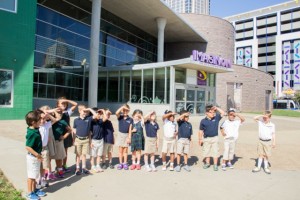
Differentiation
When our students aren’t out and about Charlotte, you are sure to find something quite unique happening inside our walls. With two teachers in every lower school classroom, grade levels are highly equipped to meet students where they are — academically and emotionally. This can take shape in a multitude of ways, however I believe it is most commonly seen in the small group interactions and approach teachers take. I love that I can sit down on the floor next to a child, read with them, confer with them, and challenge them. And I love that the teacher I work with is simultaneously doing the same thing. In conferring, we are allowing students to lead learning. A good friend of mine once shared some advice with me before an exam where she said, “You know what you know, now let your brain flex.” In differentiating, Trinity is allowing all students to flex their individual brain muscles comfortably, but not necessarily easily. And we’re always ready to add another set of weights.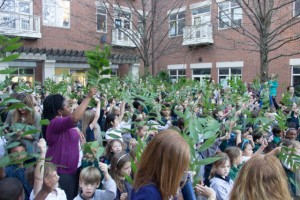
Professional Development
It would be unfair to pass over the transformation taking place as a result of professional development. Sure, teachers can attend conferences and dive into the latest and greatest curriculum. But that isn’t where professional development stops at Trinity. With a mission statement emphasizing spirituality and diversity in equal measure to academics, you are just as likely to find TES faculty and staff at a conference on social justice, parenting, or leadership styles. In fact, just this year, teachers have been asked to find time in our schedules to attend two professional development workshops. One being Communication Skills Training and the other, Dismantling Racism. Combined, I believe these two experiences will equip teachers to more adequately address issues of racial inequities that exist above and below the surface of our community. I feel empowered to work for an institution that is so willing to invest in not only my professional development, but my human development, so that I might better educate and grow others.
Spirituality and the Trinity Way
Trinity is by no means raising little Episcopalians just because we are an Episcopal school. Rather, we are a community with open arms. Open arms to our neighbors in Charlotte and to one another, including those who embrace other religious beliefs. Spirituality looks and feels a particular way within our walls, however it is difficult to put into words. Following a conversation I had regarding spirituality at Trinity, I wrote down a verse from 1 Peter that seems to capture this spiritual nature so perfectly, and far better than I ever could — “…Be agreeable, be sympathetic, be loving, be compassionate, be humble. That goes for all of you, no exceptions. No retaliation. No sharp tongued sarcasm. Instead, bless — that is your job, to bless. You’ll be a blessing and also get a blessing…” I think Peter was right about this and that his words ring true in our little culdesac on 9th Street. Trinity is a school working to bless, and in return we have been blessed. This spirituality component is integral to the community and separates Trinity from other institutions. Faith Studies and Chapel are held throughout the week, and seek to mirror the diversity of our student body by speaking from diverse perspectives. This nudges students to be open and welcoming to the vast diversity of religions and beliefs that exist within and beyond our tightly knit community, and to also acknowledge the common denominator of being innately human and a Child of God.
In 8th Grade, students are asked to write a “Dear Trinity…” letter before graduating. Several were recently shared in our school publication, and it challenged me to think of what I would say, as an employee of Trinity. What can I say? I’m three years in. Pretty much still a “newbie” to this whole “I have a job” thing. And yet, I find myself feeling incredibly spoiled. This is the only work environment I know. And it is a work environment I love because it houses passionate, growing, inspired, and honorable individuals. Adults and children alike.
I suppose I don’t have to write a letter, but if I did — here is what I’d say.
Dear Trinity,
You have reminded me that as a human, my job is to love all. And by you, I most certainly feel loved. Thank you.
Mary Kate McAlister
2nd Grade Instructional Assistant
Trinity Episcopal School
750 E. 9th Street
Charlotte, NC 28202
704-358-8101
www.tescharlotte.org
Facebook
Twitter
Instagram
Trinity Episcopal School: Creating Scholars, Nurturing Spirituality, Embracing Diversity/strong>

